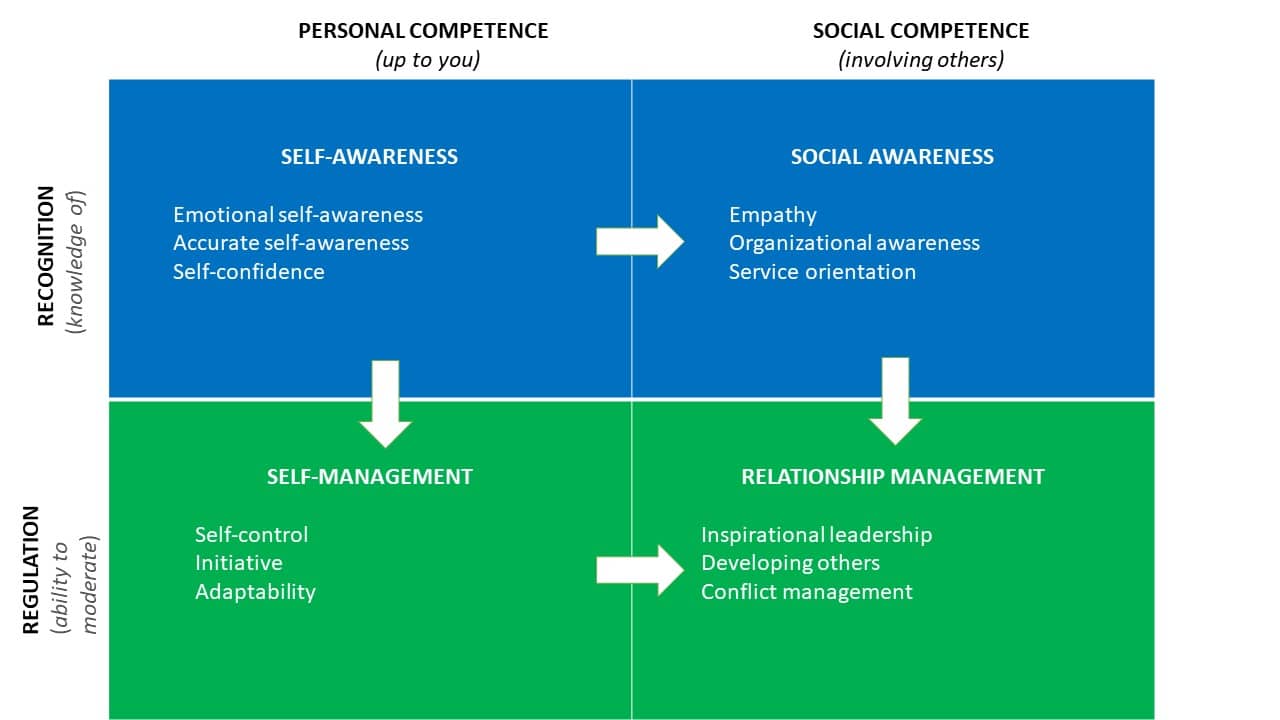The importance of the emotional intelligence for leaders

I have always wondered if a person is born a leader or becomes one. The answer is complex, but putting it in a nutshell, it mostly depends on the characteristics that a person has inherited, the ones built over time, and other skills.
Emotional intelligence is one of the most important aspects that makes someone a good leader. This soft skill could be already part of a person, or it can be cultivated with efforts. This is the crucial point that it is going to be analysed in this article.
What is emotional intelligence and why is it so important?
Emotional intelligence has been defined as the ability to recognise, understand, and manage the person’s own emotions and the emotions of others in order to navigate social and workplace demands. This skill seems trivial, but it becomes essential for a real leader, especially when she/he uses it to manage their behaviours in the best way. In fact, it is important to understand the different emotions and act towards a positive result for both parties.
When leaders are emotionally intelligent, they have the ability to remain calm under particular pressure, analyse the situation and think before reacting. This makes it easier to face any challenge in an effective and empathetic way whilst being intuitively aware of other surrounding people and situations. In this way the leader becomes an inspiring and influential example for others.
In my opinion, one of the most fascinating characteristics of the emotional intelligence skill is the possibility to improve it with self-reflections and not just in the professional life but also in personal relationship.
How is it possible to improve the emotional intelligence?
This is an interesting question regarding the possibility of developing this skill. In order to do this, you will need to improve the four fundamental elements of the emotional intelligence.
- Self-awareness, people’s ability to recognise and understand their own emotions in an effort to not let their feelings rule them. This allows to understand the link between thoughts, actions, and feelings.
- Self-management, the ability to control emotions, behaviours, and impulsive feelings. These people are able to think before their actions, and they are also capable to adapt their selves in relation to changeable circumstances.
- Social awareness, it means that the person has empathy and is able to identify desires, emotions, needs, and viewpoints of people due to an interpersonal approach focused on verbal and nonverbal communication skills.
- Relationship management, it is when the emotional awareness of a person allows him/her to interact with others successfully. To have this skill means to be able to create and maintain strong relationships, to communicate fluently and clearly and to manage conflicts.
Emotional intelligence in different fields
We know that the business world is very complex and with not enough space for emotions. So, the question is, how can the emotional intelligence help leaders and workers? The development of this skill leads to an improvement in decision making and a greater understanding of ourselves and others.
The key is the ability to calmly assess the situation and make logical decisions instead of being overwhelmed by emotions and let fear and impulsivity prevail. It is also important to create an environment based on this specific skill in order to obtain a team able to manage clients effectively and create an inclusive company culture.
Moreover, in recent years many jobs are undergoing major changes, and these are requiring workers to learn new skills. Emotional intelligence is also becoming a crucial and essential characteristic in the relationship with clients. The aim is to offer them a positive interaction that strengthens the relationship and builds loyalty and trust.
Being emotionally intelligent allows people to empathise and collaborate more, building reciprocal trust between companies and customers. In this way the business relationships are not limited to an economic transaction but allows the company to take the costumer relationship to another level and differentiate itself in a crowded market.
It’s not a coincidence that Travis Bradberry, a renowned expert in the field, explains how the emotional intelligence can lead to monetary benefits and then job satisfaction; he shows how the 90% of top performers have a high emotional intelligence.
The final step: the emotional leader
Improving emotional intelligence for a leader means improving the teamwork culture.
But it is clear that the emotional intelligence of a person is not a simple skill to measure. It is made by different abilities that connected to each other give the possibility to aim to the best interaction with customers and stakeholders.
In addition to this, a leader with a high emotional intelligence has more success in a customer-focused situation because they can quickly understand the correct way to interact with a person and achieve the best outcome. Of course, this situation creates a good feeling which helps reaching commercial success.
In summary emotional intelligence is a fundamental and required skill in the competitive work world around us. It is possible to improve it by cultivating and increasing our self-awareness in order to improve relationships with colleagues and costumers.
Written by Riccardo Pandini.
Have you read?
Best Business Schools In The World For 2022.
Best Fashion Schools In The World For 2022.
Best Hospitality And Hotel Management Schools In The World For 2022.
Best Medical Schools In The World For 2022.
The World’s Best Universities For Doctor of Business Administration (DBA), 2022.
Add CEOWORLD magazine to your Google News feed.
Follow CEOWORLD magazine headlines on: Google News, LinkedIn, Twitter, and Facebook.
Copyright 2024 The CEOWORLD magazine. All rights reserved. This material (and any extract from it) must not be copied, redistributed or placed on any website, without CEOWORLD magazine' prior written consent. For media queries, please contact: info@ceoworld.biz









